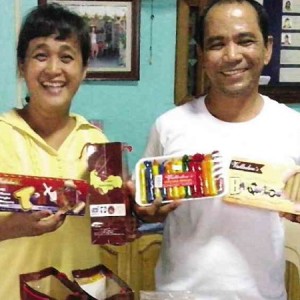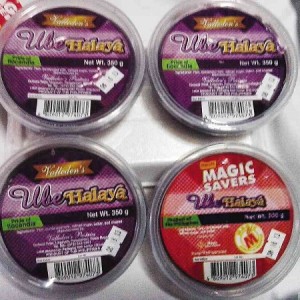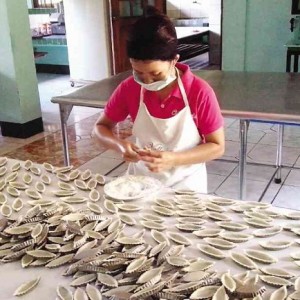Backyard sweets producer capitalizes on Filipinos’ sweet tooth

COUPLE Edwin and Rowena Bancod says whatever success they achieved started from the bottom. Photo by Yolanda Sotelo, Inquirer Northern Luzon
LINGAYEN, Pangasinan—While delivering sweets to a market stall in Baguio City recently, Rowena Bancod saw a woman asking a vendor if the product she was looking for was available. The woman showed the vendor a wrapper and told her that it came from a relative abroad who asked her to buy several packs.
“It turned out that the product was Valleden’s, our product. By then I felt that our small business had ‘arrived,’” Bancod says.
Valleden’s products include tarts, polvoron, uraro, banana chips, yema, ube halaya and other sweets produced in Barangay Quibaol in this capital town.
There is no signboard on the tree-lined pathway from a village road in Quibaol here. There is nothing at all to suggest that the pathway leads to the production area of Valleden’s, a flourishing business enterprise that capitalizes on the Filipinos’ sweet tooth.
Valleden’s products have been marketed in different provinces in Northern Luzon and are available at the Magic chain of supermarkets.
Its owners, couple Edwin and Rowena Bancod, are regulars in trade fairs and their products have become hits as giveaways and pasalubong.
But unknown to many, whatever sweet life now being enjoyed by Rowena, 44, and Edwin, 47, was a product of “hard work, with lots of tears.”
Valleden’s started in 1997 when the Bancods were forced to shut down their chicken growing business after the facility housing their stock was damaged by Typhoon “Gading.”
With a bank loan still to be paid, the couple felt their world had crumbled. It was the last blow to their livelihood, which had been hit hard by big players and contract growers who dictated the prices of chicken, with which backyard growers could not compete.
“We were already losing our capital and we were ready to close shop when Gading blew away the roof of the chicken house,” Edwin, a civil engineer, says.
But they believed that they would recover. “When God closes a door, a window opens, but we should do our part,” says Edwin.
Opportunity beckoned when Rowena’s brother, who is married to a Bicolana, came home to teach another brother how to make tarts.
The wife of Rowena’s brother had a flourishing tart-making business and they brought tart-making tools to Lingayen during their visit. Their younger brother, however, was not interested and it was Rowena who ended up learning how to produce tarts and other products.
“My brother encouraged us to start a tart-making business. The first production of tarts cost P200, mostly the cost of three tins of condensed milk,” Rowena says.
Next they produced polvoron, then yema, then other confection products which they sold in schools in the town. They named their products Valleden’s, after their daughter Valleden, a play on the words Valley of Eden. The couple’s other children are Brandon, Grandeur, Verdant and Forsythia.
It was a sweet turn of events for the financially drained couple, with their production always failing to meet the demand.
“Whatever we delivered was not enough,” Rowena says.
Soon their products caught the attention of government agencies involved in product development and marketing -– the Department of Trade and Industry, the Department of Science and Technology, the provincial government and the Department of Tourism.
The biggest break came in 2000 when the DTI provincial office and Pangasinan government teamed up for Panangidayew 2000, a trade fair at the SM Megamall.
“We were hesitant to join because we did not have a vehicle with which to bring the products. But then, we decided to go. We ordered craft paper bags to package the sweets and we hired a van. On the first day, we sold P5,000 worth of products. We were really very excited,” Rowena says.
The business started to pick up. The couple clinched a contract to supply products to Magic Supermarket, with the first order worth P3,000.
“We also joined other exhibits in other provinces with the help of the DTI. In 2001, we joined an exhibit at the Festival Mall in Alabang and we really hit it big there,” Edwin says, adding that every year they join about five events.
Rowena says they used to pack the sweets in iced candy plastic bags.
“Whenever I saw products in supermarkets in beautiful packaging, I would caress them, wishing my products would also have nice, eye-catching packaging,” she says.
Her wish came true when the DOST offered to finance the design and production cost of the first set of packages.
When the designs and boxes arrived, the couple thought that these looked expensive and feared that their customers would avoid the products thinking that their prices went.
Their fears, however, were unfounded as the products still sold fast in schools, supermarkets and trade fairs.
The Bancods have added a product to their sweet line, which seemed to be odd. Edwin has been gathering the sap from nipa trees around their production area and ferments this into an all-natural, organic vinegar.
Today, Edwin and Rowena maintain their relationships with clients as they continue to personally deliver their products to their outlets.
Edwin says communication is important to keep the business going.
“You also have to consult your family members and employees when there is a decision to be made. But you have to make the decision yourself, based on what you deem is best,” he says.

